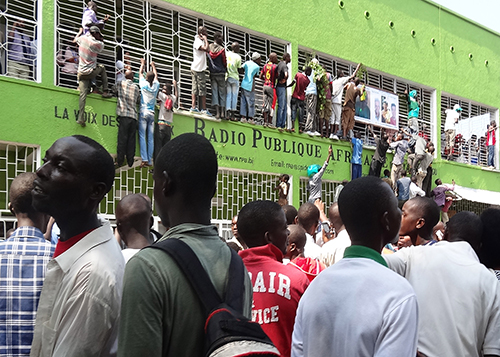Burundi journalists may have more space to report freely ahead of the country’s controversial elections this year after the legislative assembly pushed for amendments to a draconian press law and a radio director was released on bail.
This week the senate began debating revisions to the country’s repressive press law, which was enacted in 2013. The proposals were put forward by the legislative assembly last week and include a repeal of several articles including those that limited the protection of journalist sources and prohibited critical reporting on topics such as the economy, national security, public safety, and morality, according to news reports.
The proposed amendments were announced just weeks after Bob Rugurika, director of the privately owned station Radio Publique Africaine, was released on bail, in a move that has bolstered Burundi’s small but vibrant press.
More than a thousand people took to the streets in the capital Bujumbura to celebrate when a court released Rugurika on bail on February 19, according to news reports. The journalist, who had been detained for about a month, has been charged with complicity in murder, news reports said. Authorities arrested Rugurika after the station broadcast an interview with a guest who confessed to being involved in the September murders of three Italian nuns and implicated current and former intelligence and police officers in his allegations, according to Rugurika and his lawyer.
In a phone interview shortly after his release, Rugurika told me that he and others had feared his January 20 arrest was not only a ploy to silence the critical station but a warning to other journalists to toe the line ahead of elections this year. Rugurika said he was held at Mpimba prison in the capital, Bujumbura before authorities transferred him to Muramvya prison, about 50km (30 miles) outside the capital. Rugurika said that for two days during his detention, he was held in a windowless cell 1.5m by 4m in size. He told me no reason for such treatment was given, but he believes the authorities were attempting to scare him and other journalists into silence. The unwavering support by the press and civil society has managed to dispel these fears, Rugurika said. “The support shows how we stand and are engaged in our work and how the people take pride in the media and civil society,” he added.
Burundi’s press, under the leadership of the Burundi Union of Journalists, held protests called “Green Tuesdays” (green being the color of Rugurika’s prison uniform) urging Rugurika’s release. “Every Tuesday at 8 a.m., civil society and media professionals met and walked around the courthouse with green T-shirts and placards with messages demanding the release of Rugurika and justice for the Italian sisters who were murdered,” union president Alexandre Niyungeko told me. Many who participated in the protests chanted “fear has changed sides” meaning Burundians are no longer afraid of the authorities, even police retaliation, Niyungeko added. Rugurika told me: “These marches have actually strengthened civil society and proved [to them] that it can change things.”
This show of solidarity comes as proposed changes to the law would remove the threat of journalists being forced to reveal sources in court. The legal changes would allow the press more freedom to report on key subjects in the run-up to the 2015 elections, Radio Bonesha director Patrick Nduwimana said.
Burundi is scheduled to hold legislative elections in May, presidential elections in June, and senate elections in August, according to news reports. The presidential elections are expected to be contentious because President Pierre Nkurunziza is reported to be planning to change the constitution so he can run for a third term, despite civil society groups warning of unrest and protests over such a move.
If the senate accepts the amendments to the press law, news outlets will be able to challenge rulings by the state-run National Communications Council. The council would no longer be able to immediately suspend a news outlet until all court procedures have been completed, according to a copy of the amended law in CPJ’s possession.
Under the proposed changes, several journalists currently threatened with charges under the press law may be able to carry out their work without fear of arrest and prosecution. There are at least three cases in the past year and a half where state prosecutors have summoned journalists and threatened to prosecute them for their reports on alleged distribution of weapons to the youth-wing of the ruling party, Nduwimana told me. Press offences however, can still be considered criminal acts because defamation is considered a criminal offence. The press fears authorities may use this provision to silence critical reporting during the election period.
Rugurika is wary that more arrests may lie ahead for civil society and journalists who oppose Nkurunziza’s plans to change the constitution in order to run for a third term. “There will be many challenges,” Rugurika said. “Especially imprisonment following demonstrations against the president’s attempt to run for a third term.”
[Reporting from Nairobi]
